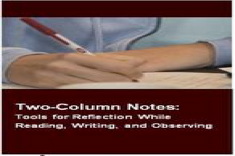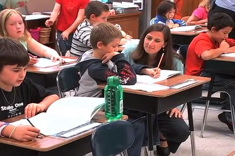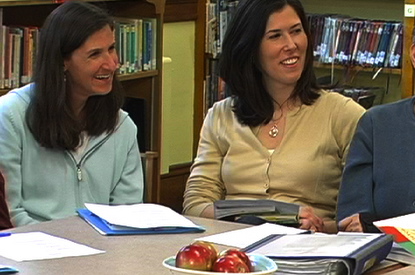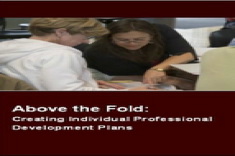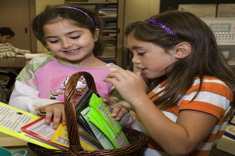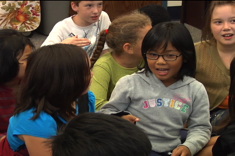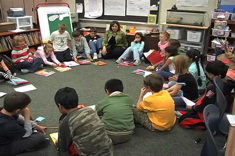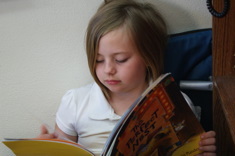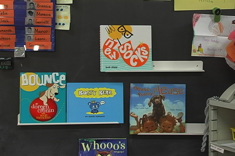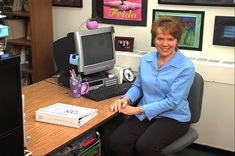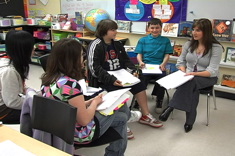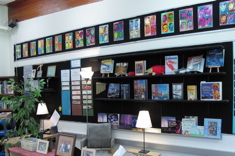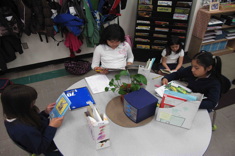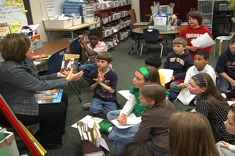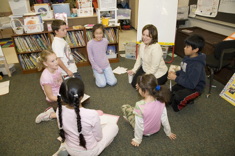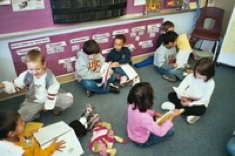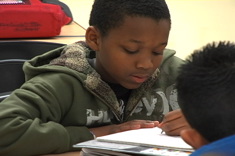Library
Choice Literacy Articles & Videos
The Choice Literacy library contains over 3,000 articles and 900 videos from 150+ contributors. Classic Classroom and Literacy Leadership subscribers have access to the entire library. Content is updated continuously, with five to six new features published each week.
Latest Content
Two-Column Notes (E-GUIDE)
The Two-Column Notes eGuide has 18 different options for notes in professional development settings. These templates are helpful to use in staff meetings and study groups while watching videos, or to focus observations during classroom visits
The Read-Around: Raising Writers
If there was a centerpiece to teaching writing that also brought students closer together, wouldn't you want to know about it? Read on about the Read-Around.
Word Choice Lesson: A Collaborative Coaching Session with a New Teacher
Jennifer Allen collaborates with a new teacher, Jessica, early in the fall to teach a lesson in Jessica’s 4th grade classroom.
Boosting Attendance at Study Groups
Brenda Power shares advice from teachers that are building and maintaining inquiry study groups with adults.
The Dog Ate My Study Group Plans! Four Instant (and Fun and Reflective) No-Prep Teacher Workshops (E-GUIDE)
This e-guide provides tried-and-true workshops plans for educators in need of energy and encouragement.
Above the Fold: Creating Individual Professional Development Plans (E-GUIDE)
Determine importance for yourself using a six-step process that individualizes a plan to help you set limits, study deeply and lead the scholarly life you deserve.
We Are All Shamu: What Literacy Leaders Can Learn from Exotic Animal Trainers
If you've ever compared your classroom to a zoo, this article by Brenda Power is for you. You'll take animal trainer advice like "We change behavior in others by breaking routines in delightful ways" and follow it into the classroom.
Poetry Friday! Poetry Books That Are Fun to Read Aloud
What do doughnuts and talk-filled mornings have in common? Learn about this Poetry Friday ritual that impacts independent reading time as well.
Fonts Lesson: A Revision Strategy for Transitional Writers
Franki Sibberson teaches a minilesson on fonts as a revision strategy for her grades 3 and 4 students.
Literacy Coach Confidential: Teachers Resent Me – What Can I Do?
We address the issue of resentment by considering how leaders can stay optimistic and use questions to open up a discussion.
Inviting Students to Organize Books and Materials
Debbie Miller advocates for involving children in the organization of materials for readers and writers in the classroom.
Charting the Course: A Yearlong Professional Development Plan for New Teachers (SCHEDULE)
Planning with the end in mind is essential for literacy leaders. Jennifer Allen takes us through her process for creating a focused and progressive year-long plan.
The Other Buddy: How Partnership Programs Help Older Readers
In many buddy reading programs we often tout the benefits for the younger, less experienced reader, but Shari Frost tells the story of a “big kid” reader with a legitimate reason to read books that were closer to his independent level. Read on.
Writing Workshop Share: Talking About Revision Tools
In this video of a discussion after writing workshop in Franki Sibberson’s classroom, intermediate students share the tools they used in revision.
Fonts: Small Group and Conferring with Intermediate Writers
In this follow-up to a whole class lesson and discussion of fonts, Franki Sibberson pulls together a group of 3rd and 4th graders from her class who have asked to be a part of a small group on fonts.
Professional Development Needs Assessment Inventory
Teachers help define a literacy coach's role through a needs assessment survey.
Time for Reading
Shari Frost describes how literacy coaches shadowed children to get a sense of how much reading students were doing.
Planning for a Year of Author Studies (TEMPLATE)
Meaningful reading, writing, speaking, and listening comes out of thoughtfully planned author studies. Gayle Gentry shares her thinking and planning.
Conferring in the Zone: Vygotsky’s Zone of Proximal Development and Writing Conferences
The zone of proximal development continues to be an important frame for noting where writers are at and what's next. Ruth Shagoury lists questions at different phases of writing to help nudge writers forward.
The Literacy Coach Work Area: Arranging Materials in Cramped Spaces
In this four-minute video, Literacy Coach Gail Boushey talks about how she arranges her materials in a limited space, and the benefits of sharing work space with colleagues.
Moving Beyond the Basics: Teaching Inferring to a Fluent Young Reader
In this conference, Gail Boushey (of “The Sisters”) confers with Brandon and helps him understand the concept of inferring.
Flexible Grouping: When, How, and Why
Max Brand explains how daily student grouping can be both planned and spontaneous.
Room for Beliefs: Linking Classroom Design and What We Value
Debbie Miller questions what our classrooms say about our beliefs and practices, and suggests how to bring our designs into closer alignment with our values.
Just Because They Can Doesn’t Mean They Should: Choosing Age-Appropriate Books for Literature Circles
Kids might be missing out on great books that are a better fit if they are reading books just because they can. Shari Frost delivers a smart reminder about challenging advanced readers.
Hooked on Series: Great Series Books for Transitional Readers
Finding the right series for a transitional reader is a gift. Franki Sibberson shares her favorite finds.
Organizing Writing Groups
Franki Sibberson describes how she organizing writing groups in her grades 3 and 4 classroom, and shares a video of a writing group considering leads.
Learning to Cross-Check: Conferring with Hailey
Joan Moser confers with five-year-old Hailey and helps her set a reading goal.
Mix It Up: Helping Young Writers Learn to Confer with Peers and Teachers
Ruth Shagoury models her own writing as a way to introduce the concept of conferring to young learners.
Letters from Home: Letting Families and Friends Teach Us
Brenda Power and Ruth Shagoury use letters from home to learn about students and build community.
Honor Books: Helping Children and Families Build Bridges Between Home and School
What does Andie Cunningham gets when she mixes pictures from the classroom, messages from families and poetry from teachers? A wonderful recipe for an Honor Book you’ll want to try with your own students.
Browse Content By
Type
Category
- Assessment Tools
- Big Fresh Archives
- Booklists
- Choice Numeracy
- Classroom Design
- Common Core
- Community Building
- Conferring
- Content Literacy
- Digital Literacy
- English Language Learners
- Equity
- Family Relations
- Free Samples
- Guiding Groups
- Leadership
- Literacy Coaches
- Mentor Texts
- Minilessons
- New Teacher Mentors
- Podcasts
- Poetry
- Quote Collections
- Reading Strategies
- Self Care
- Struggling and Striving Learners
- Talking and Listening
- Teacher Study Groups
- Teaching Reading
- Teaching Writing
- Word Study and Vocabulary
Author
- Melissa Quimby
- Nawal Qarooni
- Gwen Blumberg
- Julie Cox
- The Lead Learners
- Ruth Metcalfe
- Mallory Messenger
- Becca Burk
- Jodie Bailey
- Vivian Chen
- Mary Brower
- Stephanie Affinito
- Ruth Ayres
- Leigh Anne Eck
- Heather Fisher
- Shari Frost
- Julie Johnson
- Suzy Kaback
- Clare Landrigan
- Gigi McAllister
- Shirl McPhillips
- Melanie Meehan
- Cathy Mere
- Debbie Miller
- Tara Barnett and Kate Mills
- Tammy Mulligan
- Dana Murphy
- Bitsy Parks
- David Pittman
- Brenda Power
- Heather Rader
- Matt Renwick
- Mandy Robek
- Christy Rush-Levine
- Gretchen Schroeder
- Jen Schwanke
- Brian Sepe
- Katherine Sokolowski
- Stella Villalba
- Jennifer Vincent
Grade Level
Choice Literacy Membership
Articles
Get full access to all Choice Literacy article content
Videos
Get full access to all Choice Literacy video content
Courses
Access Choice Literacy course curriculum and training

